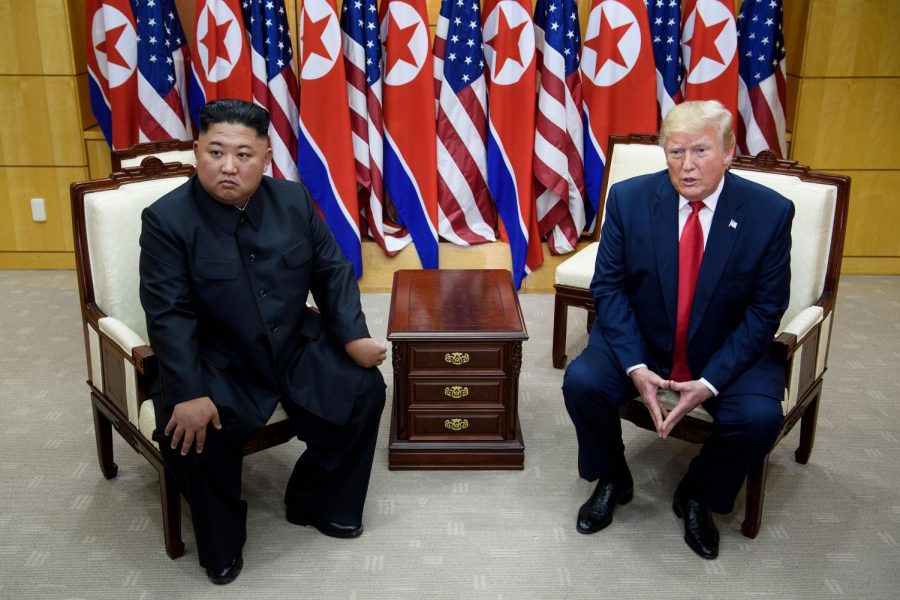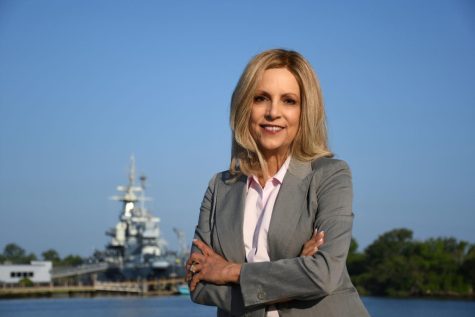OPINION: There’s a clear candidate to achieve peace with North Korea
For decades, starting in 1953 when they and South Korea signed the Korean Armistice Agreement with their shared northern rival, the United States has managed to avoid armed conflict with North Korea. By definition, though, the armistice was not a treaty, and the Korean War technically never ended, only paused indefinitely. Both enemies have since stockpiled nuclear weapons and periodically exchanged heated words.
The United States has every right to get tough with its hermit rival. North Korea carried out the first acts of violence in the Korean War, and America’s only goal was to defend its ally to the South. The Soviet Union supported the North, and the democracy-oriented defenders understood that they and their free allies would be at risk of falling in the event of a Communist victory. With backing from the peace-seeking United Nations formed less than a decade earlier after World War II, the Southern half of the Korean Peninsula, including Seoul, was able to be saved.
However, they could not liberate the citizens of the tyrannical North, who face some of the toughest human rights violations in the entire world even decades later. The hermit kingdom’s draconian laws, for example, ban disrespecting the leaders, practicing religion of any kind, accessing the Internet aside from the heavily-censored Intranet, leaving the country, driving, and even wearing blue jeans. Only three television channels are available, and all of them are state-controlled. Both men and women are also required to serve lengthy terms in the military, and even minor slip-ups such as talking during formation are considered full violations of this rule.
Penalties for violations are among the most severe in the world, and even minor offenses lead to lengthy imprisonment in labor camps, torture, and capital punishment. One Holocaust survivor testified that the North Korean prison experience is even more brutal than hers. American college student Otto Warmbier was sentenced to 15 years’ hard labor for stealing a portrait of dictator Kim Jong-Un. He was released to the U.S. after 17 months due to brain damage but could not be saved. The hermit society even has a rule where three generations of a prisoner’s family may also be sent to the camps, where they usually stay until they die.
While the exact motives for these brutal laws and punishments are not well understood, one theme seems to emerge: lack of information. The ban on leaving the country, both physically and virtually via outside television channels and Internet sites, limits the ability of both key global players like the U.S. and human rights watchdogs to understand the true extent of abuses in North Korea. Tourists are allowed but they are strictly forbidden from photographing sites deemed inappropriate by their escorts, including scenes of extreme rural poverty. The extent of the hermit kingdom’s nuclear weapons program remains unclear, including the potential for them to acquire a warhead that can strike the U.S. In summary, people are dangerous when they isolate themselves, and this theme was also evident during the Khmer Rouge and other major genocides in world history.
Today, Kim Jong-Un is rumored to be in a coma amid growing concerns for his health but the legitimacy of this information is undetermined. If he does not survive, his sister, Kim Yo-Jong, will most likely take over the throne. Top officials are eerily divided on who would pose a more serious threat to the U.S. and its allies, but early predictions indicate that Kim Yo-Jong is worse. On a slightly positive note, the claims that Kim Jong-Un is critically ill or dead may not be accurate. However, his overall health remains poor, and the political power of his sister is unknown at this time. Perhaps the mere lack of credible information from Kim Yo-Jong and the rest of North Korea is of greatest concern, regardless of the political outcome of all this.
In order to make peace with the hermit state or at least significantly reduce tensions, the first step should not be denuclearization, more sanctions, or any other tough measures for that matter. In fact, sanctions punish North Korea’s ordinary folk much more than their brutal regime, because the ruling elite can just take more resources from their citizens to compensate. Based on Kim Jong Un’s lavish lifestyle and bustling nuclear weapons program, it is clear that he does not care about serving his people, only controlling and indoctrinating them.
Peace on the Korean Peninsula requires a multi-pronged procedure. According to CNN, the first steps should include friendly actions like expanding tourism, introducing Western values, and holding more summits. The U.S. and its allies could then use such events as leverage to convince North Korea to ease its harsh isolationist policies. Such moves could possibly expose the human rights abuses, which the regime could be forced to mend under threat of military action. If it doesn’t comply, then perhaps Pyongyang could be occupied and Kim Jong-Un captured by U.S.-backed coalition forces, similar to how they liberated Iraq from Saddam Hussein in 2003.
Unfortunately, U.S. President Donald Trump has failed to execute a strong peacemaking plan. While he held summits, for instance, they were more or less intended to show off to the world rather than actually committing to easing tensions. He erroneously boasted that the country was “no longer a nuclear threat” in 2018–just a year after nearly provoking war by threatening them with “fire and fury”. Such provocative behavior only increases the risk of brinkmanship, armed conflict, and even nuclear war.
U.S. Democratic nominee Joe Biden, on the other hand, appears to be much more prepared to make real progress on this significant issue. He has made clear he will not make vanity summits or appearances. Any summit that involves him requires “an actual strategy that moves the ball forward on denuclearization,” Biden told the New York Times. He will also likely seek assistance and cooperation from as many allies as possible and address the dire human rights situation, something Trump never brought up in his talks. Yes, he is planning on more sanctions, but other than that, he’s got this thing down pat.
Blunt tactics like threats and sanctions will not help solve this convoluted diplomatic puzzle, nor will shallow moves that are only intended to draw media attention. Only careful, slow, phased, and non-provocative action will help relegate this serious issue to the history books. And Biden appears more apt for this task than the current commander-in-chief.












